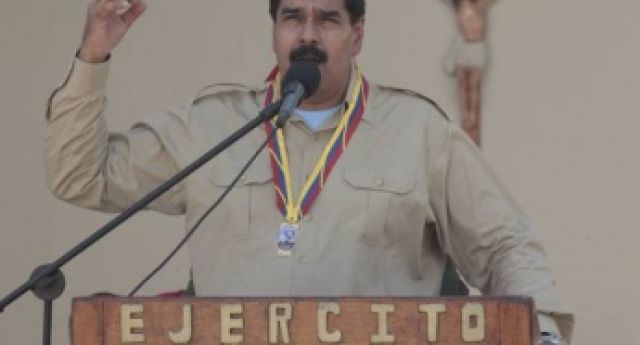
Venezuelan President Nicolas Maduro ordered the expulsion of a top US diplomat and two other embassy officials from Venezuela for alleged conspiracy with the opposition.
“Get out of Venezuela,” said Maduro during a televised political event. “Yankee go home. Enough of abuses against the dignity of a homeland that wants peace.”
The US officials named were charge d'affaires Kelly Keiderling, and two other embassy employees, Elizabeth Hunderland and David Mutt. They were given 48 hours to leave the country.
Maduro accused the officials of “meeting with the extreme Venezuela right to finance actions to sabotage the electricity system and the Venezuelan economy”.
“We’ve been monitoring some officials of the American embassy in Caracas … I have the proof [of conspiracy] in my hands,” he added.
Maduro has repeatedly referred to blackouts and relative shortages of some food products this year as an opposition attempt to “sabotage” the Venezuelan economy and destabilise the country.
US response
The Venezuelan president added today that he “doesn’t care” what the response from Barack Obama’s administration would be, declaring: “We’re not going to allow an imperial government to come and bring money to stop companies operating, [and] to take out the electricity to shut Venezuela down”.
“Senores gringos, imperialists, you have before you men and women of dignity that … will never kneel before your interests and we’re not afraid of you. We’ll confront you on all levels, the political, the diplomatic.”
The US State Department responded with a statement that the US “completely rejects” the Venezuelan government's accusation of its officials participating in the alleged conspiracy plans.
On October 2, Venezuela Analysis reported that the US had expelled three Venezuelan diplomats in retaliation.
Venezuela–US relations have remained cold since the administration of late president Hugo Chavez, who survived a US-backed coup attempt against his government in 2002. The two countries have not had an exchange of ambassadors since 2010.
Attempts to improve relations this year were cut off by Maduro after the US’s new ambassador to the United Nations made comments about Venezuela that were regarded by Venezuelan officials as “unacceptable and unfounded”.
Maduro cancles UN trip, Venezuela slams US
On September 27, Venezuelan foreign minister Elias Jaua addressed the United Nations General Assembly in New York, where he criticised the US and its allies as “hawks of war” who had “hijacked” the UN Security Council.
Jaua said that when UN member states stand against interventionist actions of the US, it and its supporters “simply bang on the table and do whatever they want, which is exactly what will happen when they later declare bombings on Syria”.
The Venezuelan official said the US had “kidnapped” the UN. He went on to repeat Bolivian President Evo Morale's argument that the UN headquarters should be moved to a location where “all nations would be respected”.
Jaua referred to accusations the US had tried to impede members of the Venezuelan delegation from attending the UN General Assembly meeting by not granting them US entry visas.
He added that Maduro had been unable to attend the gathering due to “a whole range of delays, obstacles and lack of guarantees imposed by the government of the United States” in “flagrant violation” of diplomatic obligations.
On September 25, Maduro cancelled his planned visit to the UN General Assembly, citing fears for his personal safety after receiving information of alleged “crazy” plots involving ex-US officials Otto Reich and Roger Noriega.
US government spokespersons have denied placing obstacles or refusing to grant entry visas to the Venezuelan delegation’s UNGA attendance.
However, an unnamed Obama administration official told Bloomberg news that a possible concern of the Maduro delegation was that the Venezuelan president’s plane, which was on loan from Cuba, may have been seized in New York due to the rules of the US government’s decades-long embargo on Cuban government assets.
Maduro’s own presidential plane had suffered a mechanical problem after undergoing maintenance for five months at Airbus SAS in France. The Venezuelan government is considering legal action against the aviation company on the issue.
The latest diplmatic incidents came in the aftermath of Washington allegedly prohibiting Maduro’s presidential plane from passing over Puerto Rico en route to a state visit in China on September 19. The incident provoked hurried diplomatic talks to allow the presidential flight to continue its planned route.
Coupled with Brazilian president Dilma Rousseff’s anger over US spying of her government and the refusal of permission for Morales’ presidential flight to pass through European air space in July, recent US actions toward Venezuela have caused some concern in Latin American diplomatic circles over respect for the region’s governments from Washington and its allies.
